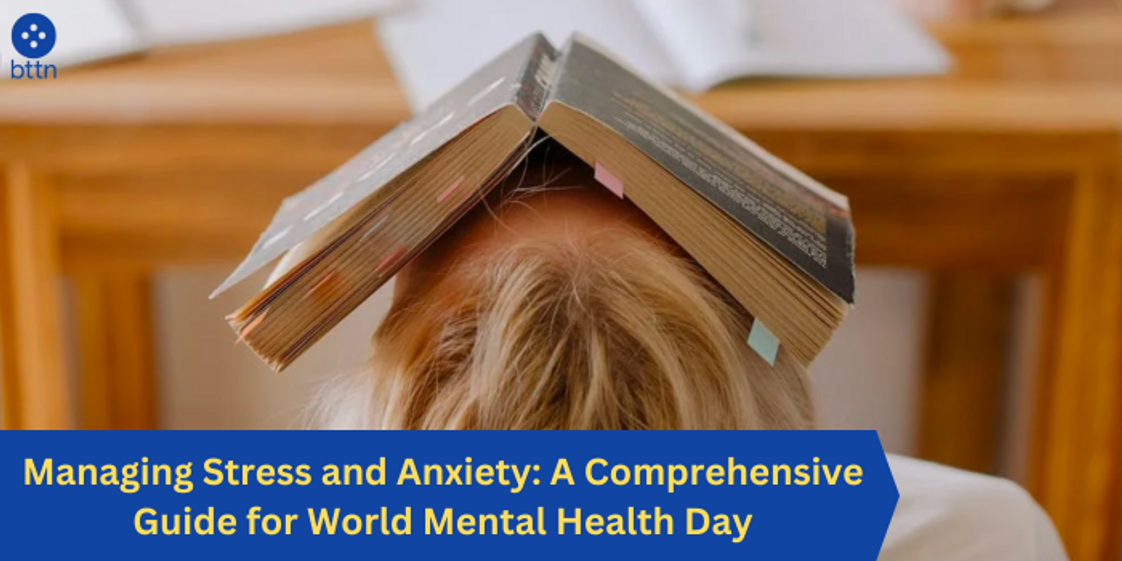
Managing Stress and Anxiety: A Comprehensive Guide for World Mental Health Day
Posted by Pankaj Dhiman on Oct 18th 2023
Tips to Manage Stress and Anxiety This World Mental Health Day
Stress and anxiety have become pervasive in our modern world. The demands of work, relationships, and daily life can often leave us feeling overwhelmed and emotionally drained. In light of this, World Mental Health Day provides a perfect opportunity to reflect on the importance of mental well-being and seek strategies to alleviate stress and anxiety.
In this blog, we'll explore various techniques and tips to help you manage stress and anxiety effectively. Whether you're dealing with everyday stressors or facing a more persistent anxiety issue, these approaches can significantly improve your mental health and quality of life.
Understanding Stress and Anxiety
Before we dive into the tips for managing stress and anxiety, it's crucial to understand what these terms mean and how they affect our lives.
- Stress: Stress is your body's reaction to any change that requires an adjustment or response. It can be caused by both good and bad experiences, such as starting a new job or facing a challenging situation. Stress, in moderate amounts, can be motivating, but chronic stress can have adverse effects on your health.
- Anxiety: Anxiety is a feeling of unease, such as worry or fear, that can be mild or severe. It's a normal reaction to stress and can be beneficial in some situations. However, when anxiety becomes excessive or irrational, it can interfere with your daily life and well-being.
Tips for Managing Stress and Anxiety
- Practice Mindfulness: Mindfulness involves paying full attention to the present moment without judgment. Engaging in mindfulness exercises, such as meditation and deep breathing, can help reduce anxiety and improve your overall mental well-being.
- Stay Active: Regular physical activity is a proven stress reliever. Exercise stimulates the release of endorphins, which are natural mood lifters. Whether it's going for a walk, hitting the gym, or practicing yoga, find an activity you enjoy and make it a part of your routine.
- Maintain a Balanced Diet: What you eat can have a significant impact on your stress and anxiety levels. A balanced diet rich in fruits, vegetables, whole grains, and lean proteins can help regulate your mood and energy levels. Avoid excessive caffeine and sugar, as they can exacerbate anxiety.
- Get Adequate Sleep: Lack of sleep can worsen stress and anxiety. Aim for 7-9 hours of quality sleep per night. Establish a bedtime routine and create a sleep-conducive environment to ensure restful nights.
- Limit Stimulants: Reduce or eliminate the consumption of alcohol and tobacco. These substances may provide temporary relief, but they can intensify anxiety in the long run.
- Connect with Others: Building and maintaining social connections can be an excellent stress and anxiety management strategy. Talk to friends and family about your feelings, seek support, and engage in activities that foster connections.
- Set Realistic Goals: Unrealistic expectations can contribute to stress and anxiety. Set achievable goals and break larger tasks into smaller, manageable steps to avoid feeling overwhelmed.
- Time Management: Effective time management can reduce stress related to deadlines and responsibilities. Create a schedule, prioritize tasks, and allocate time for relaxation and self-care.
- Learn to Say No: It's essential to recognize your limitations and not overcommit yourself. Politely declining additional responsibilities when you're already stretched thin can help maintain your mental well-being.
- Seek Professional Help: If stress and anxiety become too much to handle on your own, don't hesitate to seek the assistance of a mental health professional. They can provide valuable guidance, support, and treatment options tailored to your needs.
- Practice Gratitude: Focusing on what you're grateful for can shift your perspective and reduce stress. Consider keeping a gratitude journal to remind yourself of the positive aspects of your life.
- Relaxation Techniques: Incorporate relaxation techniques into your daily routine, such as progressive muscle relaxation, visualization, or aromatherapy, to help calm your mind.
- Limit News Consumption: Constant exposure to negative news can increase anxiety. Set boundaries on your news consumption and consider taking breaks from the news cycle.
- Hobbies and Interests: Engage in activities you're passionate about and that bring you joy. Hobbies and interests can be a great distraction from stressors and provide a sense of accomplishment.
- Stay Hydrated: Dehydration can affect your mood and energy levels. Ensure you're drinking enough water throughout the day to stay properly hydrated.
- Avoid Perfectionism: Perfectionism can be a significant source of stress. Accept that nobody is perfect, and it's okay to make mistakes and learn from them.
- Counseling and Support Groups: Joining a support group or engaging in counseling can provide a safe space to share your feelings and receive guidance from others who've faced similar challenges.
- Nature and Fresh Air: Spending time outdoors and getting fresh air can have a calming effect on your mind. Take a walk in a park, go for a hike, or simply sit outside to enjoy nature.
- Music and Art Therapy: Listening to music and engaging in creative activities like drawing or painting can be therapeutic and relieve stress and anxiety.
- Self-Compassion: Be kind and compassionate to yourself. Avoid self-criticism and practice self-acceptance.
Conclusion
As we observe World Mental Health Day, it's essential to prioritize our mental well-being. Stress and anxiety are common challenges, but they don't have to control our lives. By incorporating these practical tips into your daily routine, you can effectively manage stress and anxiety, improving your overall quality of life. Remember that seeking help from a mental health professional is always an option if you find yourself struggling. Take proactive steps to care for your mental health, and you'll be better equipped to handle life's challenges with resilience and strength.
